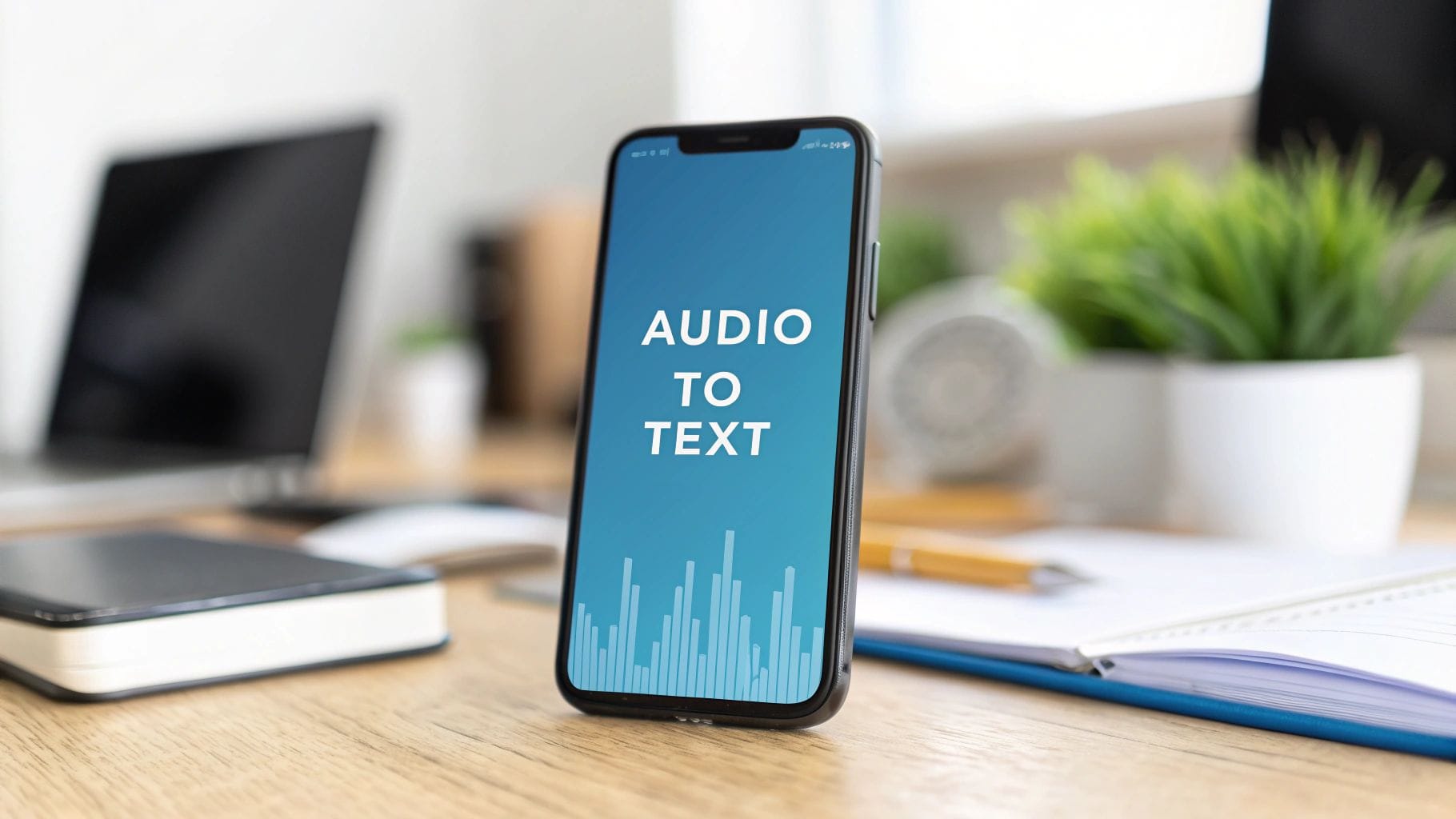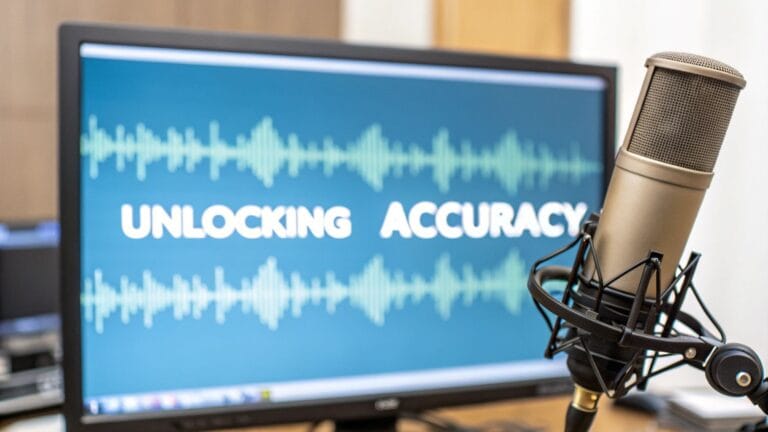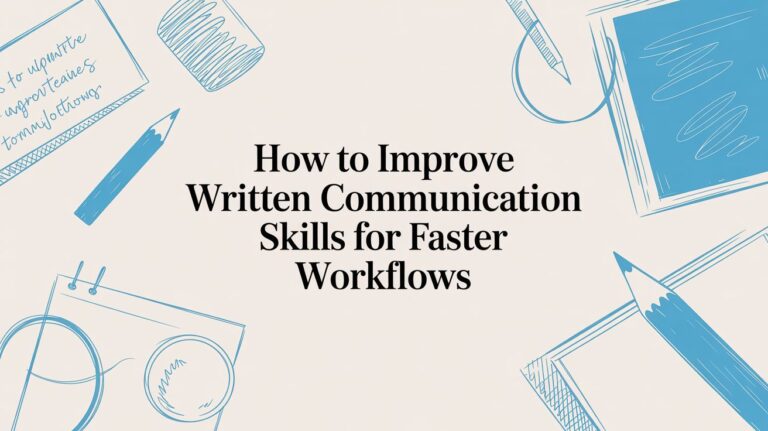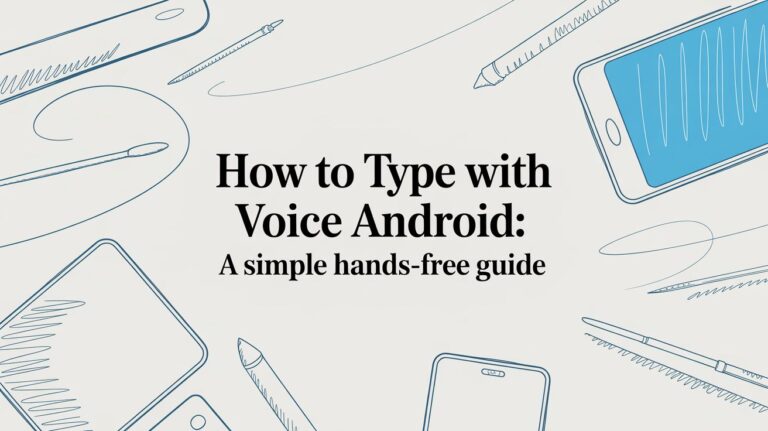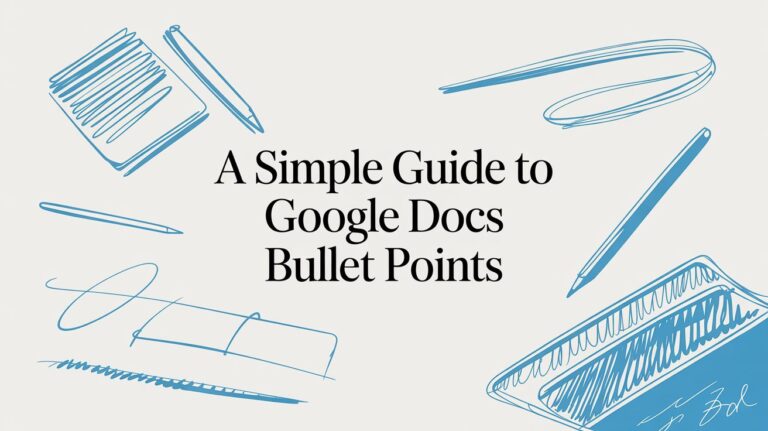How an App Can Turn Your Voice into Words
An app that transcribes audio to text is like a helper in your phone that listens to someone talking and writes down every word. It takes sounds—like a teacher's lesson or a story you tell—and turns them into words on your screen. This saves you from having to type it all out yourself.
How Apps Turn Sound into Words
So, how does an app do this? It's like a game of connect-the-dots with sounds. The app does three things very fast.
First, the app has to hear. When you talk, you make sound waves. Your phone's microphone is like an ear. It catches the sound waves and turns them into a special code the app can read.
Next, the app's brain, which is a computer helper called AI, gets to work. It breaks the sound code into tiny sound bits. Think of these like LEGO bricks for words. For example, the word "cat" is made of a "k" sound, an "a" sound, and a "t" sound.
Last, the AI puts all the sound bricks together to build words. It has a huge word dictionary in its head. It listens to the sounds and finds the word that matches. To learn more about how this works, you can read this simple guide on how to transcribe audio to text.
From Noises to Neat Sentences
But how does the app know if you said "two" or "too"? It's smart! The AI looks at the other words around it to guess the right one. This is called context.
For example, the app knows that "I want to go" makes more sense than "I want two go." It uses clues from the whole sentence to make the right choice. This helps turn your talking into sentences that make sense.
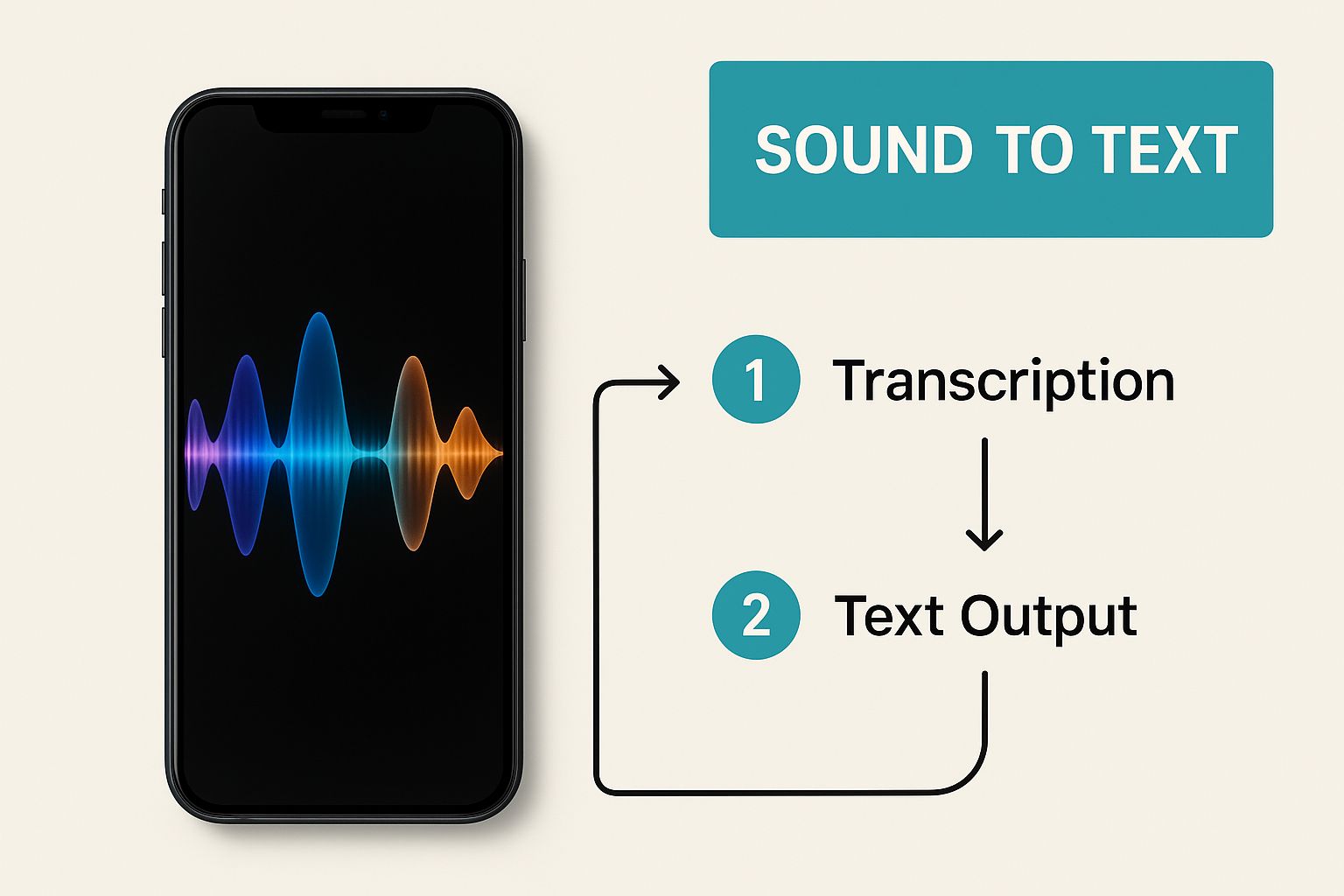
The best apps do this trip from sound to words super fast and almost perfectly.
Key Takeaway: A good app doesn't just hear sounds; it understands them. It uses its smart AI brain to match sounds to words and uses sentence clues to pick the right ones.
Not all apps are the same. Some are better at this than others. To learn about different kinds of apps, you can look at different speech-to-text software. It's this smart process that makes an app that transcribes audio to text so helpful.
What Makes a Transcription App Great?

When you pick an app that transcribes audio to text, how do you know which one is good? There are so many choices! Let's look at the most important things that make an app helpful.
How Well Does It Hear You?
The most important job for an app is to get the words right. This is called accuracy. It's like asking, "Did the app listen carefully?"
The very best apps can get almost every single word right—up to 99% of them! This is a big deal. If an app makes lots of mistakes, you have to spend a lot of time fixing them. When an app is accurate, you don't have to do much editing. For example, a student recording a science lesson needs the app to know the difference between "planet" and "plant." A great app gets these details right.
A good app can also understand people who talk differently. It doesn't get mixed up if someone has an accent or if you use special words for a job, like "dinosaur bones" for a scientist.
Does It Work Fast?
After getting words right, speed is the next big thing. How long does it take for your talking to show up as words? Some apps show you the words right away, as you are speaking. This is great for taking quick notes.
Other apps might take a minute to turn a long recording into text. This is fine if you're not in a hurry, like when you record a long story and look at it later. The important thing is to find an app that is fast enough for you. You can learn more about the tools that make this happen in our guide on voice-to-text software.
A great app gets the words right and gives them to you fast enough for what you need.
Does It Know Who Is Talking?
Imagine listening to a recording of your friends telling a story together. If all their words are mashed into one big paragraph, it's hard to know who said what! A special feature called speaker identification fixes this.
It's the app’s skill to tell who is talking and put their name next to their words. Instead of a messy block of text, you get something neat, like a movie script.
- Friend 1: "Let's go to the park."
- Friend 2: "Okay, but can we get ice cream first?"
- Friend 3: "Good idea! I'll bring the money."
Without this, you're stuck guessing. For recordings of meetings or school projects with many people, this feature is a must-have. It helps the writing make sense.
Key Things to Look For
Here is a simple checklist to help you pick a good app.
| What to Look For | Why It's Important | How You'll See It |
|---|---|---|
| Gets Words Right | So you don't have to fix a lot of mistakes. | Says it has 95-99% accuracy; understands accents. |
| Knows Who's Talking | Makes it easy to read talks with many people. | Puts labels like "Speaker 1" and "Speaker 2." |
| Is Fast | Gets your text ready when you need it. | Writes as you talk or takes only a few minutes. |
| Learns Your Words | Gets better at writing special names or words you use a lot. | A place to add your own words to its dictionary. |
| Marks the Time | Helps you find the exact spot in the sound for any word. | Puts a time next to words that you can click. |
| Saves in Different Ways | Lets you save your text in the file type you need. | Gives you choices like TXT, DOCX, or PDF. |
If you find an app that transcribes audio to text with these things, it will be a tool that really helps you.
Who Uses These Apps and Why?
You might be surprised to learn who uses these apps. They are not just for a few special jobs. Lots of people use them to make their work easier and better.
Think about a student in a classroom. The teacher might talk very fast. Instead of trying to write everything, the student can just record the lesson. Later, the app gives them a perfect copy of everything the teacher said. This makes studying much easier.
Reporters use them too. When they talk to someone for a story, they need to get every word right. An app that transcribes audio to text lets them focus on asking good questions. They know the app is making a perfect copy of the chat for their story.
A Big Helper for Busy People
For busy grown-ups, these apps are a huge help. A doctor can talk about a patient's visit into their phone. The app writes it all down. This is much faster than typing. It gives the doctor more time to help other people.
Offices have lots of meetings. An app can record a meeting and write down everything that was said. This helps everyone remember what they decided to do and who is supposed to do it. There are no more arguments about "who said what."
Why This Matters: For many people, these apps are more than just nice to have—they are super important. They save a lot of time and help people make fewer mistakes, from the classroom to the hospital.
A Fast-Growing Helper
So many people are using these apps that it has become a very big business. The U.S. market for turning voice into text is expected to be worth over $32 billion by 2025.
It's growing by about 5% every year. This shows how important these tools have become in our lives. You can find more facts about this at Dittotranscripts.com.
From students to doctors, an app that transcribes audio to text is a tool that many people need. It's a simple idea—turning sound into words—that makes a big difference in how we all work and learn.
How to Keep Your Words Secret and Safe
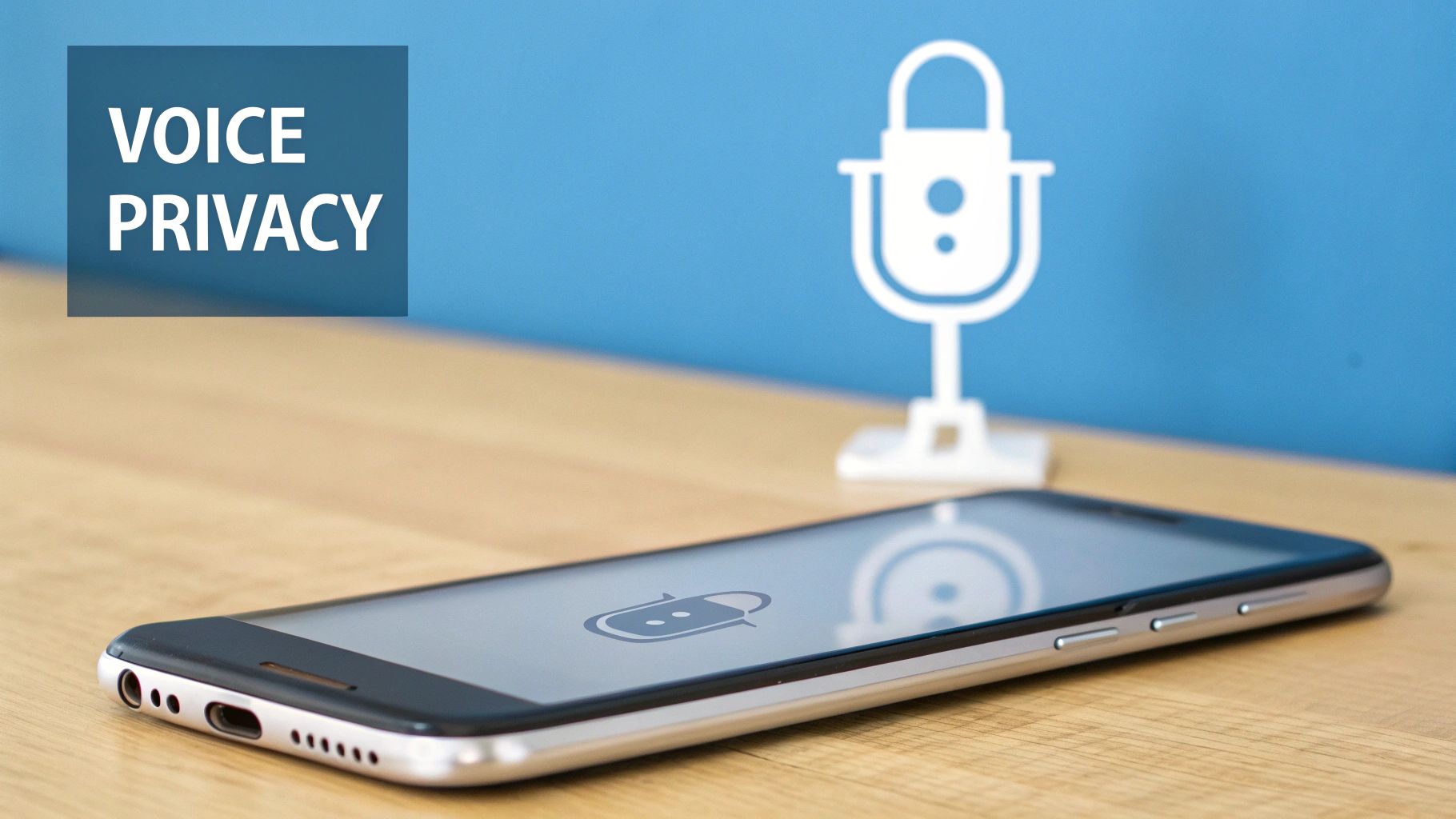
When you use an app that transcribes audio to text, you are sharing your voice and your words. That’s a big deal. How can you be sure your private talks stay private?
Think of it like whispering a secret to a friend. You trust them not to tell anyone. Good apps earn your trust with something called encryption.
Encryption is like a secret code. As soon as you talk, the app scrambles your words into a code that no one can read. Only you and the app have the secret key to unscramble it. If someone tried to peek, they would only see a bunch of nonsense, not your real words.
Checking the App's Rules
Every good app has a privacy policy. This is not just boring text. It's the company's promise to you. It tells you exactly what they do with your words and sounds. Reading it is like checking the rules of a game before you play.
A good privacy policy will say that the company does not sell your information or listen to your recordings. Some apps even have a “zero-retention” policy. This means they erase your sound files as soon as they are turned into text. They don't keep a copy.
This promise is very important. When a company promises not to keep your files, it's the best way to know your private talks will stay private.
This is super important for people like doctors and lawyers. They have to keep what their clients say a secret. To learn more about why this is so important, you can read about law firm data security.
How to Choose a Safe App
Picking a safe app is easy if you know what to look for. Here are a few things to check.
Here’s a simple checklist:
- Look for the Secret Code: The app's website should say it uses "encryption." This is your secret code that keeps your words safe.
- Read the Promise: Look at the privacy policy. It should be easy to understand and say they will not keep or share your recordings.
- Pick a Trusted Company: It's best to use apps from companies that are well-known and have a good history of keeping user information safe.
By choosing an app that transcribes audio to text that has these safety features, you can talk freely and know your words are safe.
The Future is AI-Powered Transcription
The smart helper inside an app that transcribes audio to text is getting smarter all the time. It's like a video game character that learns new moves and gets stronger after every level.
This helper is called Artificial Intelligence (AI). The AI is the app's brain, and it is made to learn from its mistakes. When it gets a word wrong, it remembers. The next time, it tries to get it right.
This means the app is always getting better. It gets better at understanding people who talk differently. It gets better at ignoring background noise, like a dog barking. The more people use the app, the more the AI learns, and the smarter it gets.
Why Everyone is Using These Apps
It's easy to see why these apps are so popular. They fix a real problem for many people. Students use them for class notes. Writers use them to write down ideas. Companies use them to save time. This is making the business of transcription apps grow very fast.
In 2024, the world spent about $4.5 billion on these AI apps. People who study the market think that by 2034, we will spend nearly $19.2 billion on them. That’s a huge jump! This shows that these tools are becoming a normal part of our day. You can read more about these market findings on strategicrevenueinsights.com.
The takeaway from this amazing growth is simple: the apps will only get better. They will become even faster and more correct in the future.
What's Coming Next?
So, what new tricks will these apps learn? Imagine an app that not only writes your words but also knows how you feel. It could tell if you are happy or sad just by the sound of your voice.
Maybe future apps will be able to make a short summary of a long meeting for you. Or maybe they could translate your words into another language right away. You could talk in English, and the app would write your words in Spanish! The future is full of exciting ideas, all because of the smart AI that is always learning.
You can check out other popular free AI applications to see how this same smart technology is helping people in other ways.
Why WriteVoice is a Game-Changer
Picking the right app that transcribes audio to text is like picking the right tool for a job. You need something you can count on. That’s why we made WriteVoice. It’s a helper you can trust to turn your talking into neat, correct text.
Think of it like having a super-fast typist who is always ready to help. It listens very carefully and gets the words right with 99% accuracy. This means you don't have to worry about fixing lots of mistakes.
It's More Than Just Writing Words
WriteVoice does something special. It doesn't just give you a big block of text. It understands how a conversation works.
Imagine you record a chat with your friends. A simple app would just give you one long paragraph. But WriteVoice can tell who is talking and puts their name next to their words.
This feature is a huge help. If you're a student working on a group project, you can easily see who had which idea. The writing is neat and easy to read, just like a script for a play.
Made to Be Easy and Safe
We also know that you need things to be fast and private. WriteVoice turns your talking into text in less than a second. There is no waiting. This helps you keep your ideas flowing without stopping to type.
And your privacy is our top rule. We have a simple promise: we never keep your audio or text files. Your recordings are yours, and only yours. That's it.
Here’s how people are using WriteVoice:
- Students: Record a lesson and get notes they can read and search through later.
- Podcasters: Quickly make a written copy of their show so more people can enjoy it.
- Busy Grown-ups: Speak their emails and reports while on the go, saving hours of typing time.
With its mix of accuracy, speed, and safety, WriteVoice is a powerful app that transcribes audio to text, made to help you do more with less work.
Answering Your Top Questions About Transcription Apps
Trying a new tool can bring up some questions. Using an app that transcribes audio to text can feel like magic, so it's normal to wonder how it works. Let's answer some of the most common questions.
Are These Apps Always Right?
No app is perfect every single time, but the best ones get very close. Things like a noisy room, a strong accent, or people talking over each other can sometimes trick the app and cause little mistakes.
Even so, the best apps can be 99% accurate when the sound is clear. My tip is to always give your text a quick look-over. It usually only takes a minute or two to find any small errors and make sure everything is perfect.
Can They Understand Different Accents and Languages?
Yes! This is where the smart AI is really cool. The app doesn't just learn from one person's voice. It learns from thousands of voices from all over the world. This helps it get very good at understanding different accents and many different languages.
A good idea is to check the app's list of languages to make sure it has the one you need. Apps like WriteVoice have learned from many different ways of talking, which makes them very reliable for people everywhere.
Are My Words Safe When I Use an App?
This is a very important question, and the answer should always be "yes." Good companies that make these apps care a lot about your privacy. They use encryption, which is like locking your words and sounds in a secret digital box that only you can open.
Before you use an app, look for its privacy policy. Companies you can trust will be open and honest about how they keep your words safe. They build their apps to be very secure so your private talks can stay private.
Ready to let your voice do the typing? WriteVoice is super fast and gets the words right, turning your speech into text in less than a second. Give it a try and see how much time you can save. Start your free trial at writevoice.io.

